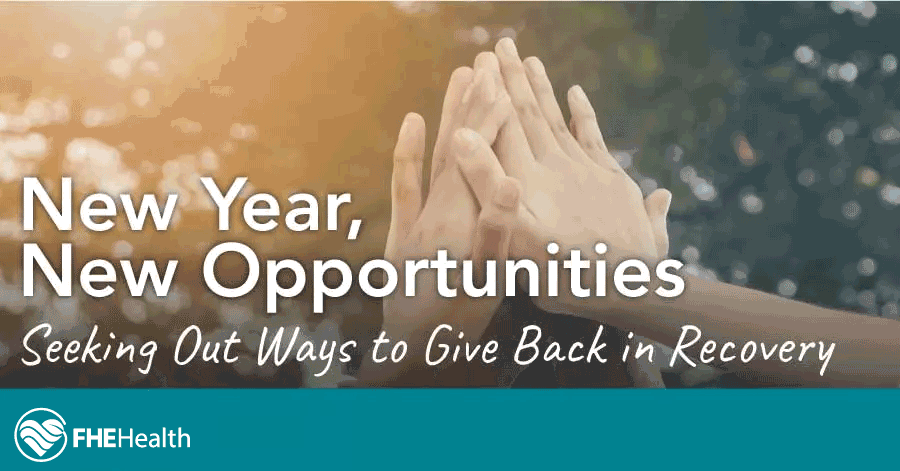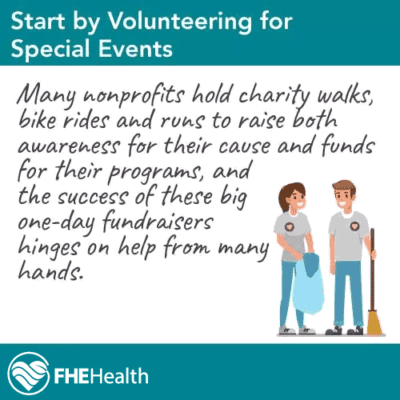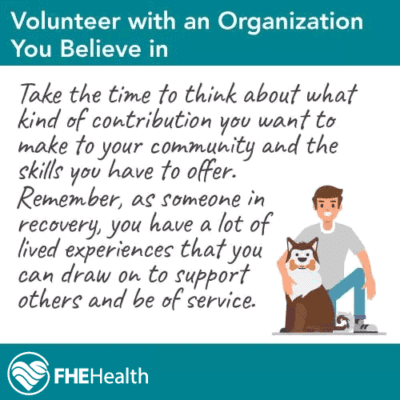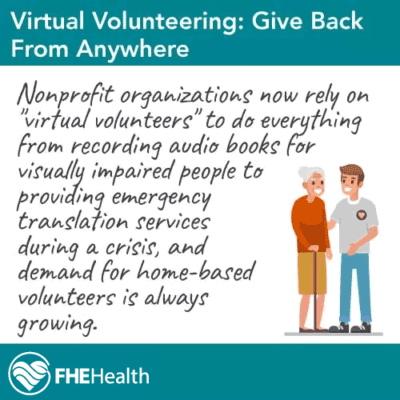
Service to others is one of the cornerstones of addiction recovery – it’s an integral part of every 12-step program, and it’s something that we encourage all of our FHE Health alumni to embrace. We have a saying within the recovery community: “You can’t keep it unless you give it away” — it’s a reference to the fact that in order to maintain your sobriety, you need to live a life of service.
Giving back helps you focus on gratitude — it makes you recognize what’s going well in your life and have a greater sense of purpose. Serving others also tends to turn down the volume on negative thoughts and harmful self-talk that often lead to relapse. Volunteering can make you more connected to your community while increasing your sense of accountability, something that’s critical to those in recovery.
And not only can giving back help your spiritual, emotional and mental health, but it’s good for your physical health as well. Studies show that when you volunteer with the intention of helping others, you may also enjoy measurable health benefits such as improved cardiovascular health and a reduced risk of mortality.
Once you’ve expressed your gratitude to those who have played the biggest roles in helping you get clean, it’s time to “pay it forward” by volunteering. Here are some ideas to help you find your ideal way to show your gratitude, discover the satisfaction that comes with supporting others and learn the inherent value of being a volunteer:
Start By Helping With Special Events
 If you’re new to volunteering and in the early stages of your recovery, the idea of taking on a long-term commitment might be too much right now. Consider spending some time working on a special event.
If you’re new to volunteering and in the early stages of your recovery, the idea of taking on a long-term commitment might be too much right now. Consider spending some time working on a special event.
Many nonprofits hold charity walks, bike rides and runs to raise both awareness for their cause and funds for their programs, and the success of these big one-day fundraisers hinges on help from many hands. There’s often a volunteer link on registration websites for charity events so you can contact the event coordinator to see what kind of assistance they need.
Other single-day volunteer opportunities include community cleanup events that bring together volunteers to remove trash from a local stream, refurbish a playground or plant community gardens. These are all great ways to try out different volunteer positions, meet others and become comfortable exploring new situations.
 Volunteer With An Organization You Believe In
Volunteer With An Organization You Believe In
Treatment and recovery involve a lot of self-reflection, and during this process, you might have discovered new passions you’d like to pursue.
Maybe you’ve always dreamed of working in an animal shelter, want to give back by volunteering at a homeless shelter or feel a calling to serve the disabled, sick or elderly. Take the time to think about what kind of contribution you want to make to your community and the skills you have to offer. Remember, as someone in recovery, you have a lot of lived experiences that you can draw on to support others and be of service.
 Virtual Volunteering: Giving Back From Anywhere
Virtual Volunteering: Giving Back From Anywhere
You can do almost anything online these days, including serving others. Nonprofit organizations throughout the world now rely on “virtual volunteers” to do everything from recording audio books for visually impaired people to providing emergency translation services during a crisis, and demand for home-based volunteers is always growing.
Volunteering online eliminates many of the barriers that can make volunteering in person difficult, especially if you’re juggling multiple work and family commitments, dealing with medical challenges or feeling anxious about meeting a new group of people.
There’s even a specific type of virtual volunteering that’s designed to make giving back simple and stress-free by breaking down volunteer jobs into small tasks that can be done in less than 30 minutes, without the need to complete any background checks, interviews or in-depth training programs. According to Mike Bright, founder of the U.K.-based micro-volunteer platform Help From Home, it’s “volunteering in bite-size chunks, on demand, on your own terms and online.” Micro-tasks can include tagging images for the U.S. National Archives, searching for affordable housing for the homeless or completing research questionnaires.
Where to Find Volunteer Opportunities
One of the best ways to find meaningful opportunities to give back is connecting with others in your recovery community. As an FHE alumnus, you have access to our alumni services, which include our regular alumni community volunteer events at which we lend a hand to local organizations. We’re proud to have partnered with a number of charities, including Habitat for Humanity, the American Cancer Society and Feeding South Florida.
You can also check at local libraries, hospitals, and community resource centers to see what organizations in your area need your help. Church groups, sober living homes, and homeless shelters are also great places to connect with volunteer opportunities, and if you’re active on social media, consider reaching out to your network.
There are a number of online resources for volunteer postings as well, including:
- VolunteerMatch.org, which allows you to search for both local and virtual volunteer positions from more than 100,000 nonprofits that match your particular preferences
- DoSomething.org, a youth-orientated global movement that harnesses social media to promote grassroots campaigns focused on human rights, the environment and positive social change
- CreateTheGood.org, a branch of AARP that “expands on traditional ways to volunteer by connecting people with simple activities, time-flexible opportunities and a wide variety of interests”
It’s important to know that some volunteer positions involve extensive background checks — that can mean criminal record searches as well as employment and reference verification, especially if the tasks involve direct contact with kids or others who may be vulnerable. If you have a criminal record, be sure to be upfront about that when applying as a volunteer — honesty is always the best policy.
Want to Know More About Giving Back During Recovery?
To learn more about why giving back is such a critical part of the recovery journey contact us here at FHE Health. Our alumni program staff can help you explore volunteer opportunities and find ways you can be of service in your community.






